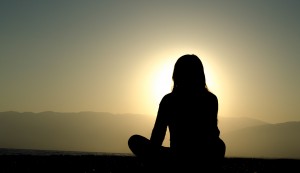It’s hard for me to be quiet for long. Although I don’t like noisy, crowded rooms, I love having my music around so much that my headphones are practically glued to my ears. I hate making small talk, but if the conversation centers on Doctor Who or Buffy, I’m more than likely to talk someone ear off. There’s a calm to the quiet, but it’s still unsettling to my modern mind, which is so used to having some kind of background noise.
Gaining an appreciation for silence is something a lot of religions seek out. Elizabeth Gilbert practiced an intense Buddhist meditation called Vipassana while staying in the ashram as a way of practicing detachment. Vipassana requires just sitting in silence and not shifting the body once you’ve sat down. Practicing this particular meditation helped her gain an appreciation for the idea of being less talkative and neurotic.
Catholicism has its own appreciation for silence and has its own form of silent meditation. Sure we have praise and worship, Liturgy of the Hours, and a million litanies, but the Church also offers Adoration. I love the silence of Adoration. More often than not, though, I tend to use Adoration to dump all my thoughts in the presence of God. I pray a Rosary and then babble on in my thoughts.
Eventually, the calmness of the hour I spend in Adoration finally sinks into my heart. There’s a great freedom in letting go of your thoughts and focusing more on God’s presence. Vipassana doesn’t allow for thoughts of God because some Buddhists consider God to be “the final object of dependency, the ultimate fuzzy security blanket, the last thing to be abandoned on the path to pure detachment.” Liz Gilbert preferred her “Slumber Party Theology.”
Neither of these philosophies hit the mark. There’s a beautiful paradox in the way that Catholics detach themselves from worldly things and surrender themselves to God. It’s not becoming dependent on a warm and fuzzy imaginary friend. God is not safe, after all. The Pharisees and Romans didn’t crucify the Son of God because he was telling everyone what they wanted to hear.
Mother Teresa explains this better:
In the silence of the heart God speaks. If you face God in prayer and silence, God will speak to you. Then you will know that you are nothing. It is only when you realize your nothingness, your emptiness, that God can fill you with Himself. Souls of prayer are souls of great silence.
When we are silent in the presence of God, we become less of ourselves and more like Him. An interesting thing I observed about Eat, Pray, Love is that although Elizabeth found the happiness she sought from her mid-life crisis, there were times that she came off as a tad pretentious and self-centered. She never liked the idea of Christ being the only path to God. Sorry, lady, but it’s right there in black and white in John 14: 6 “ “I am the way and the truth and the life. No one comes to the Father except through me.”
I understand that some people will probably find that concept of only one way restrictive. But letting God into our lives and allowing us to lose ourselves in Him paradoxically brings out the best version of ourselves. Having a life in Christ doesn’t mean that everyone becomes a cookie-cutter copy of each other. You just have to look at the community of saints to see that in that “one path,” there is diversity. Bishop Robert Barron compares it to light being fractured through a prism into an infinite number of colors. Instead of many paths leading to one way, finding ourselves in God leads to a more beautiful life.
There’s a song by Matt Maher called “Empty and Beautiful” that captures this spiritual journey of God finding us and how emptying ourselves into Him leads us to finding True Beauty.













